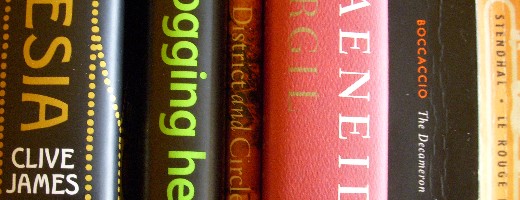Wednesday
Morning Read
The end of Blogging Heroes at last. I don’t think that I’ve ever read so boring a book about a subject that interested me. (Second place goes to the second volume of a Life of Harty-Tarty, written shortly after that gentleman’s demise in 1908, that was so deadly dull that I gave it away without making a note of its author.) As a conspectus of big-time blogging today (what I was naively hoping for), Blogging Heroes is so generally uninformative that only historians bother with it.
Yippee.
¶ In the Decameron, VI, iii, the joke sits on a really rather far-fetched story. Dego della Ratta wants to sleep with a married woman so badly that he agrees to pay her husband a heap of gold coins for the privilege. Then he has the nerve to gild a heap of silver coins instead, making the husband doubly a laughingstock. This is the sort of gossip that I always find it hard to believe. It’s such a “good story” that, if it didn’t happen, it ought to have done.
As for the woman who freshly alludes to this transaction (she feels that her own honor has been impugned), we’re told that she subsequently died in the Black Death. The references are so real-life and up-to-date that it’s almost as though Boccaccio had handed the Decameron over to a guest blogger for a week.
¶ The Aeneid continues to remind me of Poussin. As the rites in honor of Hercules wind down, Virgil gives us a picture that it’s hard to believe the French artist didn’t paint.
talia carminibus celebrant; super omnia Caci
speluncam adiciunt spirantemque ignibus ipsum.
consonat omne nemus strepitu collesque resultant.So they sing
his praise, and to crown it sing of Cacus’ cave,
The monster breathing fire, and all the woods resound
with the ringing hymns, and the hillsides echo back.
¶ Le rouge et le noir grows even more operatic — if only Berlioz could have written it! How well he would have captured the pricked egotistical passion of Mathilde for Julien, who so coldly and studiously ignores her in his passion for revolutions. What a wonderfully belting trio might have been composed! The (baritone) Count of Altamira — how operatic is that! — tells of his persecution by the King of Spain, while Julien (tenor) thrills in sympathy and Mathilde (can’t make up my mind — she’s too imperious not to be a mezzo) raves that she is losing her head to love for a plebeian.
I have all but made up my mind that Le rouge et le noir is really two novels, told in succession. The first is a sort of minor-key Marriage of Figaro, and it ends when Julien leaves the Franche-Comté. The second is intoxicatingly Parisian — La Traviata with conspiracies. The first belongs in an opera workshop, the second at the Met.
¶ Speaking of operas, Clive James tells us of a youthful infatuation with Henning von Tresckow, the Prussian officer who masterminded two plots against Hitler.
At once stage I was so struck with Henning’s heroism that I thought of writing an opera libretto about him. The piece would have been written as a long flashback from the moment of his death, which Henning accomplished by walking into the forest and blowing himself up with a grenade.
James claims, no doubt disingenuously, that he abandoned the project because it would have required him to write the aria, “Let the Russians freeze first.” I don’t think that that would have stopped Verdi.
¶ Today’s Blogging Hero: Grant Robertson, of the umpteenth Weblogs, Inc offering, Download Squad. Mr Robertson seems like a pleasant, well-spoken bloke, but I could barely read the blatherific interview, because I was so thrilled to be finished with Blogging Heroes.
It’s probably unfair to expect this book to be informative, when what it’s so obviously straining to be is inspirational. You, the idjit who bought this book because you were thinking about making some money by running a blog, don’t really care about all those other guys’ sites; all you want to know is how they did it. SEO? PPP? Free Goodies? AdSense? You want your MTV!

